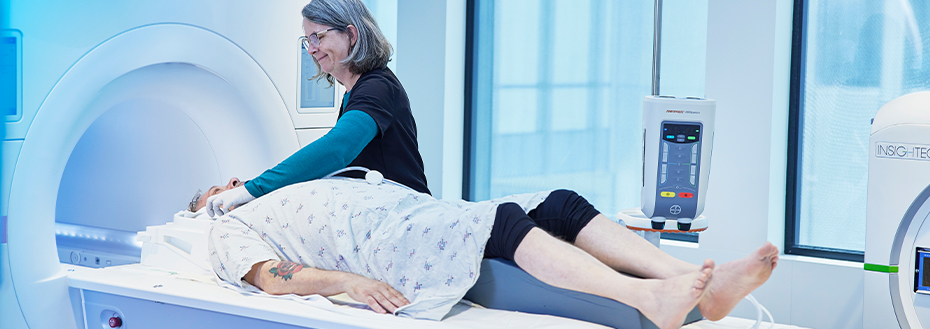Cardiac MRI

Magnetic Resonance Imaging (MRI) lets us see your moving heart without radiation. 博彩网站’s cardiac (heart) MRI scanners can measure your heart volume and function, assess valves, look for evidence of prior heart attacks and measure blood flow to your heart.
- 博彩网站 was the first hospital in the Pacific Northwest to offer PET/MRI, which combines MRI with a PET scan to produce highly detailed images of your heart.
- Our cardiac imaging experts can do the precise tests needed to treat conditions like amyloidosis. 博彩网站 offers the only treatment and research center in Oregon for amyloidosis.
- Our team has special expertise in MRI scans for patients with heart implants that use electricity or other outside power, such as pacemakers and defibrillators.
What is cardiac MRI
MRI uses a large magnet, radio waves and a computer to produce detailed images of your heart and surrounding tissue.
Because radiation is not used, there is no risk of exposure to radiation during an MRI procedure.
博彩网站 also offers a cardiac PET/MRI, which combines an MRI and a positron emission tomography (PET) scan, so you don’t need separate appointments.
What cardiac MRI is used for
A cardiac MRI is used to diagnose a heart condition or to check how treatment is working.
Your doctor might suggest a cardiac MRI to help diagnose or monitor treatment of conditions such as:
What happens during a cardiac MRI scan
You will get detailed instructions on MyChart about how to prepare for your cardiac MRI. It’s important to follow these instructions to make sure you are safe and your results are accurate. If you don’t follow the instructions, we may have to reschedule your scan.
Before the scan
Because of the strong magnet used in an MRI, you must remove all jewelry and metal objects like hairpins or barrettes, hearing aids, eyeglasses and dental pieces.
MRI cannot be performed on patients with:
- Implanted pacemakers
- Intracranial aneurysm clips
- Cochlear implants
- Certain prosthetic devices
- Implanted drug infusion pumps
- Neurostimulators
- Bone-growth stimulators
- Certain intrauterine contraceptive devices
- Any other type of iron-based metal implants
- Internal metallic objects such as bullets or shrapnel
- Surgical clips, pins, plates, screws, metal sutures, or wire mesh
During the MRI scan, we will give you a substance called a contrast, which makes your organs show up more clearly on the scan. You’ll get the contrast medication by IV in your hand or arm.
During the scan
During the scan, you’ll lie on a table that will slide into the tunnel of the scanner.
The MRI staff control the scanner from another room, but they can see you through a window.
Staff can talk to you through speakers inside the scanner. You will have a call bell inside the scanner to let staff know if you have any problems.
During the scan, you’ll hear a clicking noise. This happens as the magnetic field is created and pulses of radio waves are sent from the scanner. You might wear headphones to block out the noise and to hear any messages or instructions from staff.
It is important that you remain very still during the scan.
You will be asked to hold your breath, or to not breathe, for a few seconds at a time. Holding your breath helps your heart show up more clearly on the scan.
After your appointment
After your test, our team will send the results to your doctor. Your doctor will review the results and share their recommendations with you.
Your cardiac MRI results play a part in your treatment. But they do not determine your treatment. Your doctor will think about things like your age, other test results, risk factors and overall health in recommending next steps.
Cardiac PET/MRI scan
For some conditions, your doctor might recommend a combined PET/MRI scan.
A PET scan is a nuclear medicine imaging test that uses a small amount of radioactive tracer to create detailed, 3D images of your heart. A PET scan can catch certain conditions before other imaging tests like CT scan or MRI.
Getting a PET/MRI means you don’t need to make separate PET and MRI appointments.
Your doctor might recommend a PET/MRI if you need frequent scans, such as if you’ve been diagnosed with hypertrophic cardiomyopathy, amyloidosis or sarcoidosis. A PET/MRI scan may also be a better option for older people and those with a weakened immune system.
博彩网站 was the first hospital in the Pacific Northwest to offer PET/MRI. Our scanner is the only one between Seattle and San Francisco.
For patients
Call 503-494-7999 to:
- Request an appointment
- Seek a second opinion
- Ask questions
Locations
Center for Health & Healing, Building 1, South Waterfront
3303 S. Bond Avenue
Portland, Oregon 97239
Center for Health & Healing, Building 2, South Waterfront
3485 S. Bond Avenue
Portland, Oregon 97239
博彩网站 Knight Cardiovascular Institute Cardiology Clinic, Beaverton
15700 SW Greystone Ct
Beaverton, 97006
Free parking for patients and visitors
Refer a patient
- Refer your patient to 博彩网站.
- Call 503-494-4567 to seek provider-to-provider advice.